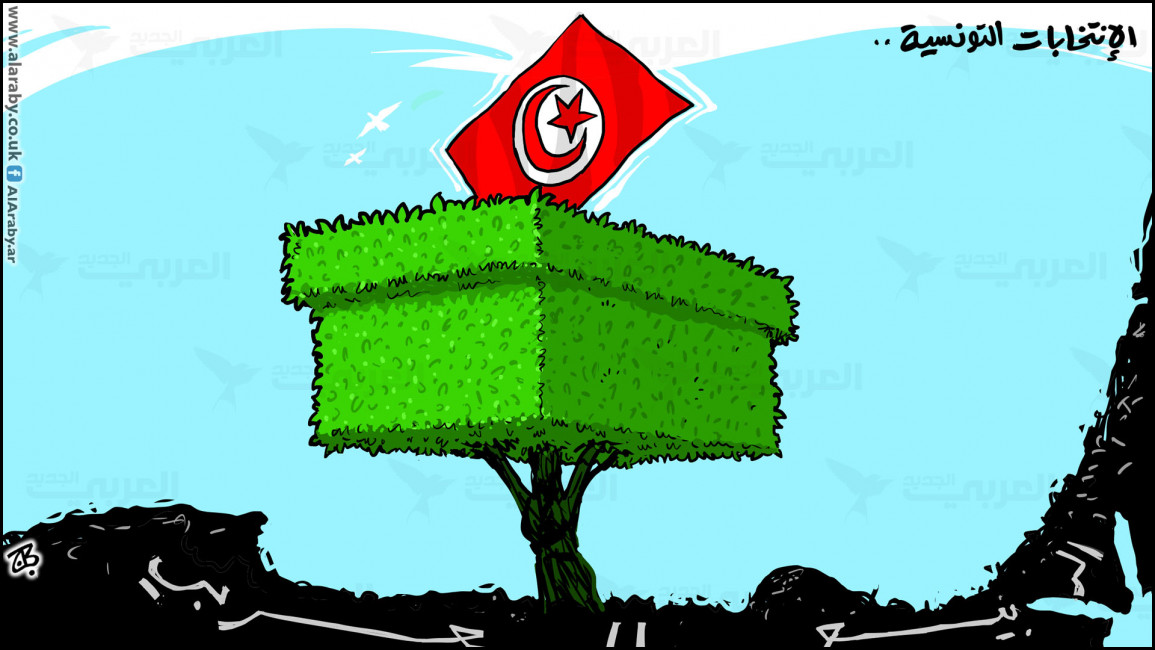
A loss for Ennahdha, a win for Tunisia
A loss for Ennahdha, a win for Tunisia
By accepting its loss at the ballot box, the Islamist Ennahdha movement has shown Tunisia's democracy is maturing
3 min read
The election ushered in a new era (Al-Araby al-Jadeed)
The sight of Tunisians standing in long lines, waiting for their turn to vote in the parliamentary elections, convinced me that Bouazizi did not die in vain and that the counter-revolution did not break the revolution’s dreams. The sacrifice of those who fought for freedom, dignity and democracy has finally begun to pay off, and people are finding their voices. Among the failures of other revolutions in the Arab world, Tunisia is a success story.
Tunisians have managed to save their revolution, which has been targeted by powers both inside and outside the country. The 62 percent turnout at polling stations strongly proves that the people are still committed to the revolution, unhindered by terrorism, and that the birthplace of the Arab Spring is on the verge of a major democratic shift following two successful elections. Among the failed revolutions in other Arab countries, where could you have found a leader admitting defeat in elections and congratulating his opponent for winning? Sheikh Rached Ghannouchi did exactly that with Béji Caïd Essebsi.
In this election, the second major political test since the revolution, Ghannouchi’s moderate Islamist party, Ennahdha, lost to Essebsi’s secularist party, Nidaa Tounes. But either way, the real winner was Tunisia itself. These elections show that the country has overcome the obstacles that nearly destroyed the nascent democracy.
|
The birthplace of the Arab Spring is on the verge of a major democratic shift. |
When the Constituent Assembly introduced the political isolation law that banned members of the old regime from political participation, Ghannouchi and others wisely refused to vote for it and go down the same path that led Libya and Iraq to a destructive civil war. Tunisia chose to forgive and refused to exclude anyone, even Zine El Abedine Ben Ali’s henchmen. This is the difference between democracy, which promotes acceptance of rivals, and dictatorship, which does not accept any partners.
Ennahdha did not come first in the elections, but Tunisia successfully reached a historical consensus based on the rules of democracy. I believe that Ennahdha lost for three reasons. First, too many expectations had been placed on it. Tunisians voted for Ennahdha in 2011 in the wake of the revolution when the government had limited resources and broad opposition. During Ennahdha’s two years in power, it was natural for voters to blame it for the problems created under the previous government, even if it had the political advantage. People vote with their pockets, not only with their minds.
Second, opposition party Nidaa Tounes benefitted from a protest vote against Ennahdha, even though Nidaa Tounes is made up of a mixture of former members of Ben Ali’s regime, followers of Tunisia’s first president, Habib Bourguiba, and businessmen concerned about their privileges. People who cast a protest vote do not necessarily consider who will benefit.
Third, Ennahdha is going through its own transitional phase which comes at a high political and electoral cost. It is gradually changing from a closed fundamentalist and Islamist party, to an open, conservative, right-wing party. While defending the culture of Islam, it simultaneously accepts the rules of democracy and respects freedom of religion. It seems that in this election, Ennahdha lost some of its traditional followers, who supported it for it for purely religious reasons. And it has not yet benefited from its increasingly open and moderate stance. Ennahdha may still attract new supporters, who have yet to take on board its transformation.
Opinions expressed in this article remain those of the original author and do not necessarily reflect the opinions of al-Araby al-Jadeed, its editorial board or staff.
This is an edited translation from our Arabic website.



